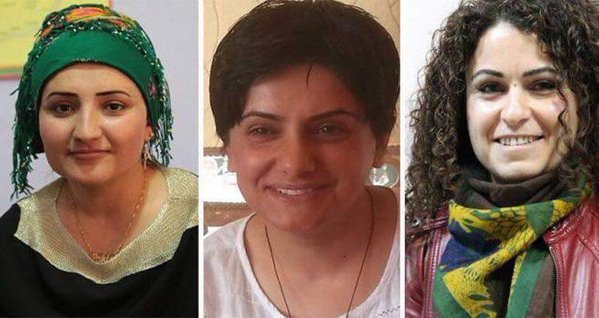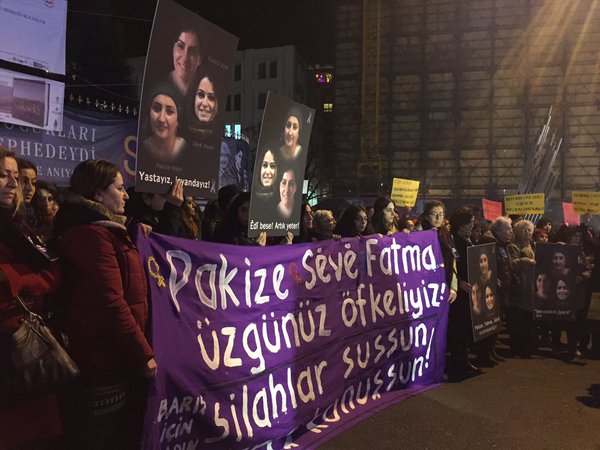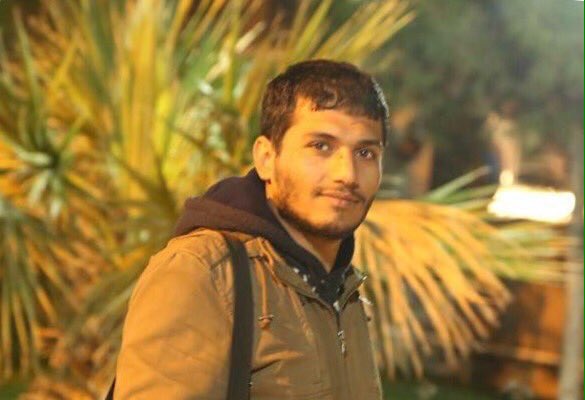Three Kurdish Politicians Killed by Turkish Armed Forces
Three Kurdish rights campaigners affiliated with the pro-minority and pro-Kurdish People’s Democratic Party (HDP) were on Monday night killed in Silopi, a district in the Şirnak Province in northern Kurdistan (southeastern Turkey) when Turkish armed forces who have laid siege to several Kurdish towns and districts opened fire on them as they were trying to reach Yeşiltepe neighborhood, news agencies and Kurdish parliament members report.
The killed women are Seve Demir, member of the Democratic Regions’ Party; Fatma Uyar, member of Free Women’s Congress; and Pakize Nayır, co-chair of Silopi People’s Assembly.
Another person was killed alongside the three women. The HDP told AFP that the man could initially not be identified because “his face was so badly disfigured” but Dicle News Agency now says the man in question is 20-year-old Islam Atak.
Aycan İrmez, a member of parliament for HDP, called the killings a “deliberate execution”. According to Ms. İrmez, Turkish officials refused to send an ambulance to the crime scene to take the injured civilians to a hospital due to “the conflict” in the area.
Çağlar Demirel, another member of parliament for HDP, said at a press conference about the three killed politicians that their murders are a political crime. Citing Turkey’s Prime Minister Ahmet Davutoğlu as having said, “politicians will pay the price too” [for what the Turkish government wrongly calls PKK terrorism in the Kurdish regions], Ms. Demirel asked: “Is this why Kurdish women politicians are targeted?”
.@caglardemirell: Yesterday our fellow three Kurdish woman politicians were killed in #Silopi. This is a political crime
— HDP English (@HDPenglish) January 6, 2016
She reiterated Ms. İrmez’ statement regarding getting an ambulance to the scene: “Ministerial level contact was made asking for an ambulance. An ambulance was not sent as we learned it was an execution.”
Since July 2015, more than 100 Kurdish civilians have been killed due to Turkish armed forces’ excessive use of force, a number still rising. It has also caused the displacement of 200,000 people.
Killing with impunity
Despite claims made by the Turkish government, its national supporters and international allies and superficial reporting by some media, the Kurdish people have not been granted greater cultural and political rights. A reform package from 2013 was a mere attempt by Turkey to improve its image to the international community.
All the while Kurdish politicians, lawyers, journalists, activists, academics and civilians are still targeted by the Turkish state. They are victims of arbitrary arrests, harassment, killings and every Kurdish gathering or demonstration demanding protection of Kurdish rights and justice have without fail been cracked down upon harshly with excessive use of force that usually results in the death of one or more civilians.
Since mid-August, the Turkish state has imposed curfews on several Kurdish towns and districts leaving people with no access to medical aid, with no food and drinking water and forced to keep their killed family members in makeshift freezers because they cannot take them to the hospital or bury them.
The Turkish state has presently deployed 10,000 soldiers, police officers and private security units to Kurdish areas under the guise of fighting “PKK terrorists” when it is in fact local youth.
Dismissing any sympathy for the Kurdish armed resistance as “terrorism” is a clear indication of the government’s failure to realize its role in forcing the Kurdish people to empower themselves in other realms than just the political one. Today’s resistance mounted by the Kurds in parliament and the streets is a reaction to Turkey’s ongoing oppression of the Kurdish people and the denial of granting them meaningful political and cultural rights.
Journalist Asya Tekin from JINHA (Women’s News Agency) recently wrote from Cizre in the Şirnak Province where she witnessed the Turkish armed forces bombing the house she was staying in:
During these two weeks, 22 people have been killed by bombs, grenades, hand weapons and snipers. […] I have witnessed how the state’s massive destruction of people’s homes has forced them to seek refuge in basements and storerooms. Up to 150 people are huddled together in such places and they are in desperate need of heat and clean water to drink.
The people in Cizre do not want to leave. The injured are scared to go to the hospital because they fear being shot by snipers. Even those who walk with white flags are shot and killed.
Human Rights Watch (HRW) released a report last month documenting a few of the killings and the accounts of civilians injured by the Turkish armed forces.
Emma Sinclair-Webb, HRW’s senior Turkey researcher, said:
The Turkish government should rein in its security forces, immediately stop the abusive and disproportionate use of force, and investigate the deaths and injuries caused by its operations.
To ignore or cover up what’s happening to the region’s Kurdish population would only confirm the widely held belief in the southeast that when it comes to police and military operations against Kurdish armed groups, there are no limits – there is no law.
The curfews have been detrimental in that they allow for the Turkish armed forces to kill with impunity. Journalists have said it is harder now to get access to Kurdish regions in Turkey than it is in some parts of Syria, hence there is no one to observe and report about the extent of the Turkish military’s use of force, the ways in which it targets the civilians, the number of killed civilians and the degree of havoc caused by the Turkish state’s siege on Kurdish neighborhoods.
There are Kurdish journalists present but they are targeted because they are Kurdish.
Nedim Oruç, a reporter for Dicle News Agency, was on Tuesday reported to have gone missing after being beaten by Turkish special operation units. Police refused to inform Mr. Oruç’s family and colleagues about his whereabouts until later when they admitted he was being detained at the Silopi police directorate.
He is now charged with “spreading propaganda for an illegal organization”, i.e. PKK, the Kurdish armed resistance movement and according to Firat News Agency he is kept in Şirnak T Type Prison.
Calling for an end to violence and killing
As of January 5th, 446 academics and researchers in Turkey have signed an open letter, which calls on the Turkish state to “abandon its deliberate massacre and deportation of Kurdish and other peoples in the region.”
The Turkish state has effectively condemned its citizens in Sur, Silvan, Nusaybin, Cizre, Silopi, and many other towns and neighborhoods in the Kurdish provinces to hunger through its use of curfews that have been ongoing for weeks. It has attacked these settlements with heavy weapons and equipment that would only be mobilized in wartime. As a result, the right to life, liberty, and security, and in particular the prohibition of torture and ill-treatment protected by the constitution and international conventions have been violated.
– Academics for Peace
We at Alliance for Kurdish Rights support the call demanding the Turkish government to end the curfews immediately and without delay bring justice to victims and relatives of victims of the exaggerated use of violence and lethal actions against civilians, including children, women and old people.
We are disturbed by the fact that the international community still has not expressed any form of concern for the loss of civilians lives, some bearing the signs of outright executions. We are concerned that the international community will allow Turkey to continue killing civilians with impunity.
You can follow the grave and worsening situation in the Kurdish areas under curfew on our crowdvoice as we regularly update it with recent news and reports.
Note: Quotes from the HDP’s official English account have been edited for clarification.



Comments are closed.